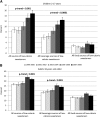Low-calorie sweetener consumption is increasing in the United States
- PMID: 22854409
- PMCID: PMC3417218
- DOI: 10.3945/ajcn.112.034751
Low-calorie sweetener consumption is increasing in the United States
Abstract
Background: Low-calorie and no-calorie sweeteners (LCSs) have emerged as alternatives to added sugars. Research suggests that consumption among all Americans is increasing, yet it is unknown whether consumption trends differ among population subgroups.
Objective: Our study aimed to assess recent national trends in LCS consumption among children and other demographic subgroups in the United States.
Design: We used NHANES data collected in five 2-y cycles from 1999-2000 to 2007-2008. Consumption of foods and beverages with LCSs was estimated by using one 24-h dietary recall. Estimates of the proportion of the population consuming foods and beverages containing LCSs (prevalence of consumption) were weighted to obtain nationally representative results. Trends in prevalence of LCS consumption and mean intake of beverages sweetened with LCSs were tested by using chi-square tests for trend and F tests.
Results: In 2007-2008, the percentage of children and adults consuming foods and beverages containing LCSs increased. The prevalence of consuming beverages with LCSs increased from 6.1% to 12.5% among children (P-trend < 0.0001) and from 18.7% to 24.1% among adults (P < 0.001). Increases in the prevalence of consumption of calorie-containing beverages with LCSs were observed among all weight, age, socioeconomic, and race-ethnicity subgroups in both children and adults. However, little change in consumption of no-calorie beverages with LCSs or LCS-containing foods was found.
Conclusions: The consumption of LCS-containing beverages has doubled among US children over the past decade. Further research is needed to understand the health effects of this trend.
Figures


References
-
- Flegal KM, Carroll MD, Ogden CL, Curtin LR. Prevalence and trends in obesity among US adults, 1999-2008. JAMA 2010;303:235–41 - PubMed
-
- Ogden CL, Carroll MD, Curtin LR, Lamb MM, Flegal KM. Prevalence of high body mass index in US children and adolescents, 2007-2008. JAMA 2010;303:242–9 - PubMed
-
- Hanson LA, Korotkova M, Hahn-Zoric M, Zaman S, Malik A, Ashraf R, Amu S, Padyukov L, Telemo E, Strandvik B. Perinatal PUFA intake affects leptin and oral tolerance in neonatal rats and possibly immunoreactivity in intrauterine growth retardation in man. Nestle Nutr Workshop Ser Pediatr Program 2006;57:223–33; discussion 233–4. - PubMed
-
- Blackburn GL, Kanders BS, Lavin PT, Keller SD, Whatley J. The effect of aspartame as part of a multidisciplinary weight-control program on short- and long-term control of body weight. Am J Clin Nutr 1997;65:409–18 - PubMed
Publication types
MeSH terms
Substances
Grants and funding
LinkOut - more resources
Full Text Sources
Miscellaneous

